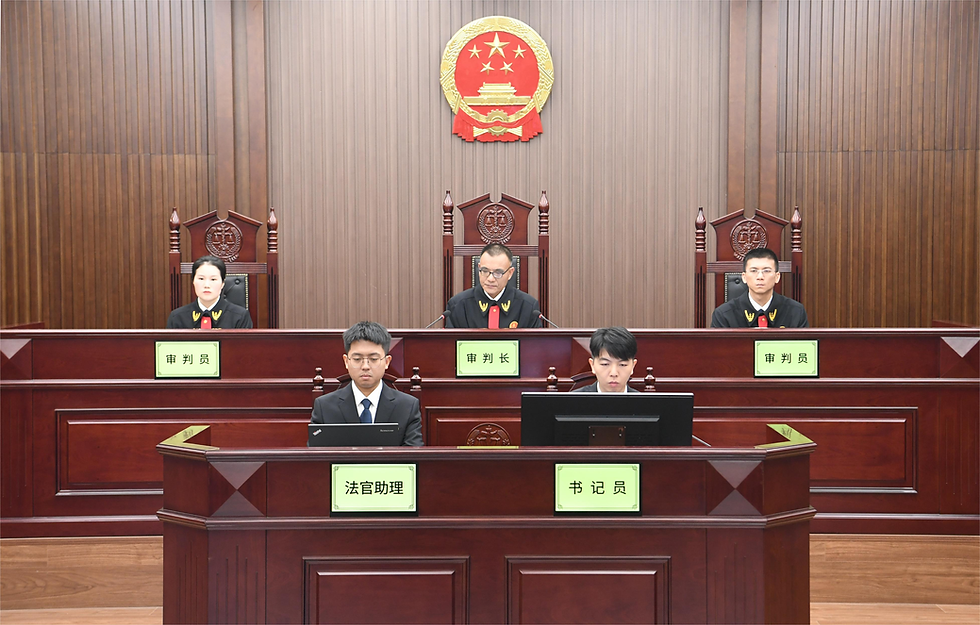How to Entrust a Chinese Lawyer to Represent a Litigation Case When Abroad?
- Allen

- Mar 21
- 4 min read
If overseas parties need to participate in or respond to litigation in China, they generally need to go through certification procedures for some litigation materials:
Identity - proof materials;
Litigation documents signed and sealed by foreign parties, including litigation instruments such as powers of attorney, complaints, and applications;
Objective evidence materials formed outside the territory of China.

Ordinarily, after a party entrusts a lawyer, the lawyer will guide or assist the party in preparing relevant certification materials. This article mainly focuses on how a party abroad can entrust a Chinese lawyer to handle a litigation case. Once a Chinese lawyer is entrusted, the lawyer can represent the party in court, and the party may choose whether to attend the court session. In the case of a divorce lawsuit where the party's presence is mandatory, or if the party, despite being abroad, wishes to attend the court session, the Chinese lawyer can contact the judge to arrange for the party to participate in an online court session.
If you are abroad and wish to entrust a Chinese lawyer to represent you in a lawsuit, you can contact our team.
The signatures and seals of foreign parties come in two types: the signatures of foreign natural - person parties themselves and the signatures of representatives of foreign enterprises or organizations. Depending on the signing location, the certification procedures for the power of attorney signed and sealed by foreign parties vary as follows:
(I) Signing within China
Witnessed by a judge of the People's Court of China. Foreign natural - person parties themselves or representatives of foreign enterprises or organizations can present their identity - proof documents (such as passports) and entry - proof documents (such as entry records shown electronically) and sign documents like powers of attorney and complaints under the witness of a judge of the People's Court of China. After being witnessed by a judge of the People's Court of China, there is no need to go through notarization, authentication, or other certification procedures.
Notarized by a Chinese notary office. Documents such as powers of attorney and complaints signed within China by foreign natural - person parties themselves or representatives of foreign enterprises or organizations can go through notarization procedures at a Chinese notary office. After being notarized by a Chinese notary office, there is no need to go through authentication or other certification procedures.
(II) Signing Outside China
When foreign natural - person parties themselves or representatives of foreign enterprises or organizations sign powers of attorney outside the territory of China, depending on the different situations of the countries where the above - mentioned personnel are located, they need to go through notarization, authentication, or other certification procedures (such as "Apostille", etc.):
(1) If the country where the foreign enterprise or organization is located is a contracting state of the "Convention Abolishing the Requirement of Legalization for Foreign Public Documents" and China has not made any reservations regarding it, the identity - proof documents of the foreign enterprise or organization need to be notarized by the notary office of the country where it is located and affixed with an "Apostille".
(2) If the country where the foreign enterprise or organization is located is not a contracting state of the "Convention Abolishing the Requirement of Legalization for Foreign Public Documents", or is a contracting state of the "Convention Abolishing the Requirement of Legalization for Foreign Public Documents" but China has made reservations regarding it, the identity - proof documents of the foreign enterprise or organization need to be notarized by the notary office of the country where it is located and authenticated by Chinese embassies or consulates. If the country where it is located has no diplomatic relations with China, it can be notarized by the notary office of that country, authenticated by the embassy or consulate of a third country having diplomatic relations with China in that country, and then further authenticated by the Chinese embassy or consulate in that third country.
If you want to know which countries are contracting states of the "Convention Abolishing the Requirement of Legalization for Foreign Public Documents", you can refer to the article: "Convention Abolishing the Requirement of Legalization for Foreign Public Documents" (with a list of contracting states and a list of local foreign affairs offices issuing Apostilles) will come into force in China on November 7, 2023.
It should also be noted that before submitting all foreign - language materials to the court, if they are not in Chinese, they must be translated into Chinese by a translation company designated by the Supreme People's Court of China within the territory of China and stamped with the translation seal of the translation company. Otherwise, the Chinese court will not review or accept them.
If you have any further questions regarding entrusting a Chinese lawyer for litigation or need professional legal services, don't hesitate to reach out to our experienced Chinese lawyer team. We are dedicated to providing high - quality legal representation and guidance to help you navigate through the legal process smoothly. Please contact us via [contact] for prompt assistance.



Comments